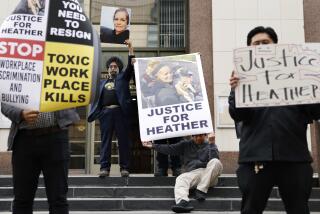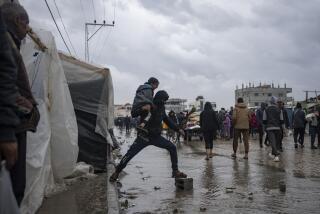Iraq Escalates Dispute Over Arms Inspections
- Share via
UNITED NATIONS — The latest dispute with Iraq appeared Thursday to be escalating anew into confrontation, even as officials here and in Washington continued to be cautious and low-key in their attempts to get Baghdad to resume cooperating with weapons inspectors.
Iraq on Thursday issued bellicose attacks on reports by U.N. inspectors suggesting that the Iraqis could restart chemical, biological and nuclear weapons programs without detection as a result of last week’s edict by President Saddam Hussein blocking new inspections.
In a letter to the head of the Security Council, Iraqi Deputy Prime Minister Tarik Aziz denounced the reports as “bogus” and concocted in coordination with the United States. Aziz also resumed his attack on Richard Butler, the Australian chief U.N. weapons inspector, whom he accused of being a tool of the U.S.
Earlier this week, Butler and Mohammed Baradei, director general of the International Atomic Energy Agency, reported in separate letters to the council that Iraq’s new stance had crippled inspections and increased the chance that Baghdad could resume development of atomic, biological and chemical weapons.
Butler also has told reporters that he suspects that Iraq unexpectedly cut off inspections because the U.N. experts were closing in on more evidence of illicit arms projects.
The council reviewed the letters Thursday but delayed any official response until at least Monday, despite calls by U.S. representatives for quick action. Last week, the council declared Iraq’s action “unacceptable” but made no mention of consequences for Baghdad.
Also Thursday, Prakash Shah, the special envoy of U.N. Secretary-General Kofi Annan, arrived in Baghdad and had an inconclusive meeting with Aziz.
Shah told reporters that he relayed a message from Annan urging Iraq to resume cooperation with the inspections. But he said Aziz only promised to convey his words to Iraqi leaders--presumably Hussein.
The envoy told reporters that he would remain in Baghdad for “as long as it is necessary for the Iraqi authorities to continue this dialogue” and that he expected to meet again with Aziz at an unspecified date.
“I mentioned to him [Aziz] that there is a unanimous view in the council that Iraq should continue its cooperation with the U.N.,” Shah told a news conference. “Mr. Aziz indicated to me that he had taken the secretary-general’s message on board; that he wanted to convey the Iraqi point of view, the Iraqi concerns, the Iraqi apprehension.”
A Western diplomat here said France and Russia, two nations generally sympathetic to the Iraqi position, also were seeking to persuade the regime to back down.
Despite the heightened rhetoric and the alarms sounded in the Butler and Baradei letters, there is no atmosphere of crisis here to match what occurred last fall and winter.
The clash over weapons inspections then nearly erupted into military action by the U.S. against Iraq. Many top officials, including Annan and Bill Richardson, the U.S. ambassador to the U.N., are on vacation; Richardson returned for one day to attend a Security Council meeting on Iraq last week.
The muffled response to Iraq this time stems in part from experience--that battles with Baghdad often turn into standoffs that drag on for weeks--and in part from a decision by the Clinton administration not to immediately escalate the situation.
In Washington on Thursday, P.J. Crowley, a spokesman for the National Security Council, repeated assertions that the U.S. would not “play a cat-and-mouse game” with Hussein and that economic sanctions imposed by the U.N. on Iraq would not be lifted until inspections resume and officials were convinced that Baghdad had eliminated all its illegal weapons.
But critics have noted that the administration’s position overlooks the fact that sanctions were not expected to be lifted any time soon and the possibility that Baghdad’s real goal is not the elimination of sanctions but the ability to resume weapons research and production without prying by U.N. inspectors.
For now, the administration is content to let Annan take the lead in trying to get Hussein to reverse his stand, diplomats here say. Annan has said the latest Iraqi actions break the accord he reached in Baghdad in February with Hussein for complete access by inspectors to all sites in Iraq.
The U.S. would prefer to cast the situation as a conflict between Iraq and the U.N. rather than between Washington and Baghdad and, if Annan continues to be rebuffed, hopes that it will be able to rally support for punishment for Iraq, possibly including a military strike, officials say.
But that strategy runs the risk that Annan will equivocate in condemning Iraq. Some of his advisors believe that the sanctions are no longer effective and regard the inspectors as too intrusive.
The U.S. response, diplomats say, also is constrained by the erosion of international support for military action against Iraq. The Arab world, in particular, has turned away from the U.S. position out of dismay over Washington’s refusal to publicly pressure the Israeli government into returning more of the occupied West Bank over to Palestinian control, officials here say.
More to Read
Sign up for Essential California
The most important California stories and recommendations in your inbox every morning.
You may occasionally receive promotional content from the Los Angeles Times.













